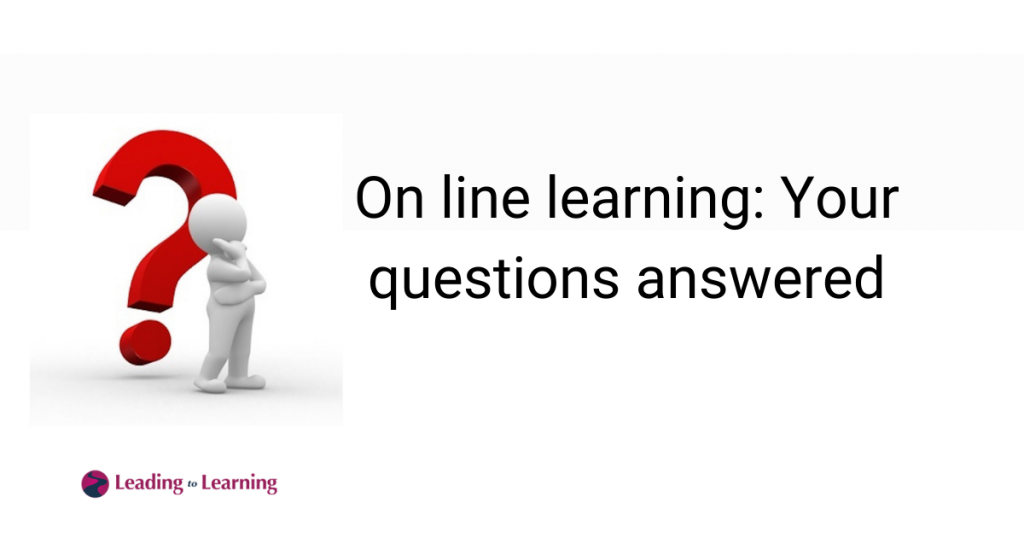Parents have asked me many questions during my teaching career. Questions about their child’ progress or lack of it. Questions about the school system. Questions about learning and behavioral issues they are trying to handle.
All good questions.
Here are some of the questions I have been asked and the answers that go with them. I hope this information is useful to you. If you have a question related to your child’s education or learning do not hesitate to ask. patricia@leadingtolearning.com I will answer in the next Q and A article.
These are some of the questions I get about on-line learning. Enjoy!
- Why is one of my children having trouble with learning on line while the other just loves it?
My granddaughter is devastated that she is having to go back to school! For her learning on-line has been a wonderful experience. Her brother, on the other hand, can’t wait to get back into a classroom even though he has done well with on-line learning.
They are both at good schools. They both have good teachers. They both have good parental support. So what makes the difference?
They prefer to learn in different ways.
My granddaughter is a bit of a loner, she likes her own company and having responsibility for her learning. She likes a step by step approach to issues – that is why she is such a good climber – and doesn’t need a lot of feedback from others.
Her brother likes company. He likes to discuss ideas and sees the big picture that they present. He has managed with on-line learning but doesn’t like it.
Two students – two preferences in learning style – two different attitudes about learning on line.
Yes, there can be differences in the quality of teaching, there can be problems with technology and access to it, but the main reason why some students take to on line learning more than others is because of the way they like to learn.
Knowing how your child likes to learn is an important step in knowing how to support their education.
Check out the free diagnostic assessment on my site to discover how your child learns best.
https://leadingtolearning.com/wp-content/uploads/2021/01/Ways-of-Learning-1.pdf
- What will be long term effects of students learning on line?
No one knows for sure. But here are some of my predictions.
On line learning is not going away. It will be around in some form or another from now on. High school graduation requirements will include one or more on line courses – some are doing this already.
On line courses for young children will disappear – much to the relief of many parents – and students will be gradually introduced to the skills required to learn on-line.
Teachers will be trained in creating courses – maybe not all but certainly one or two in each school- and the effectiveness of these courses will increase as a result.
Schools will advocate for more access for students by fundraising for the necessary technology or to provide universal access.
I don’t think that there will be a long term issue around what children learn but there might be some long anticipated adaptations to the curriculum.
- How long will on line learning go on for?
See the answers above. For a child in high school it could become a regular part of their schooling.
- How much help should I be giving my child? On line learning is taking hours of my time.
Younger students, who have not yet developed the skill of taking responsibility for their own learning, need a lot of support. But you can use that support to help your child develop the skills he needs to become an independent learner.
Older students might only need help on an occasional basis.
Remember that if you are getting stressed you will be passing that stress onto your child.
Check out my on-line courses that show you how to take the stress out of working with your child while helping him or her develop the skills needed to become an independent learner.
https://leadingtolearning.thinkific.com/manage/courses/
- What danger signs should I be looking out for?
Some signs of stress are very obvious. Your child might develop sleep issues and a change in eating habits. He or she might appear anxious and upset when working on line and start avoiding doing the work.
If these situations persist you should tell the teacher and cut down on the amount of work your child has to do.
Other signs are more subtle. A lack of interest in what was previously an engaging activity can indicate mild depression. Lack of motivation is a sure sign that something is not going right.
Don’t forget to watch for danger signs in your behavior too. How are you coping with the extra workload? Is it making you rethink your involvement in your child’s education? Is it making you wonder about your child’s learning abilities?
If you have questions and need help or advice feel free to get in touch. I may be able to help.
patricia@leadingtolearning.com

